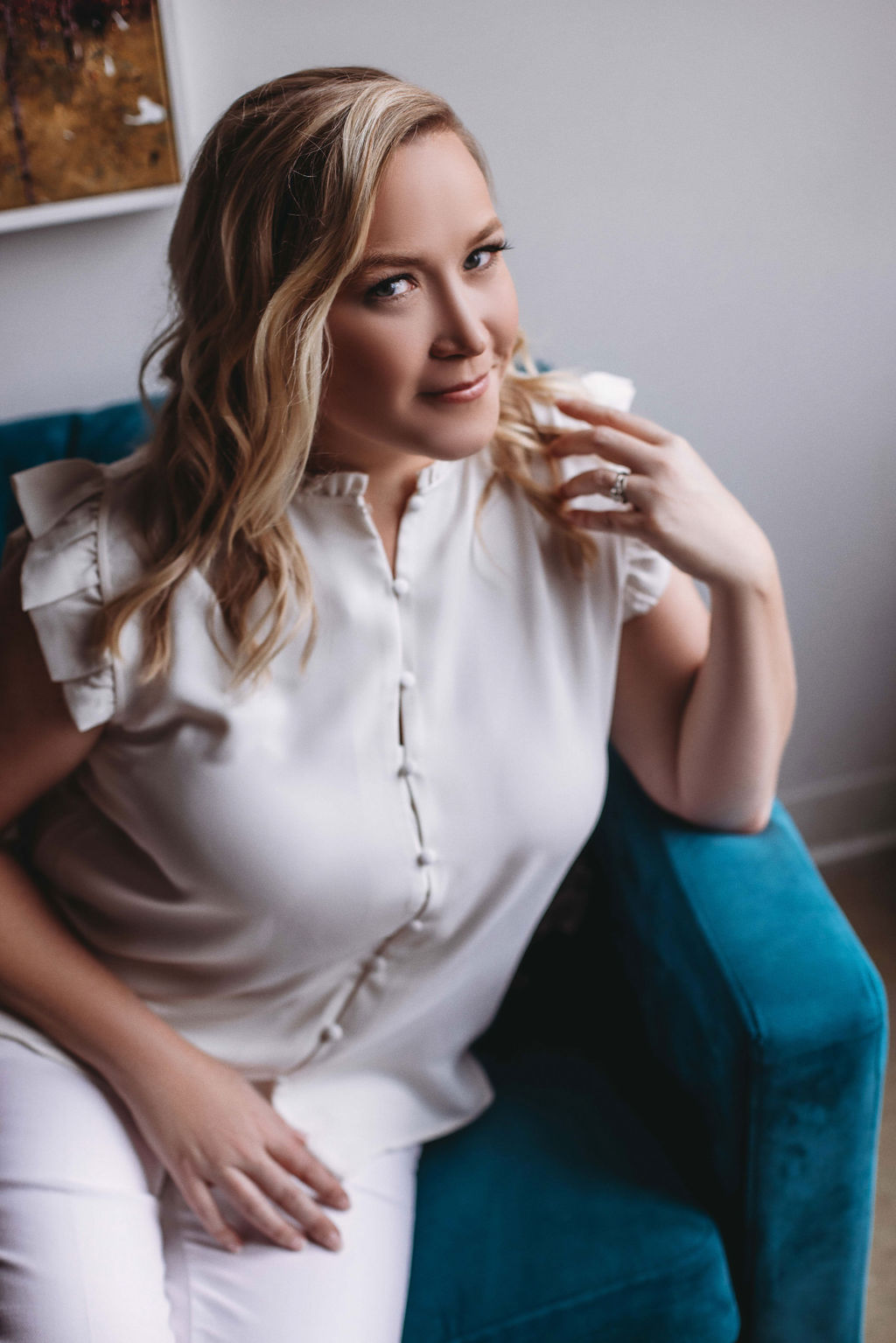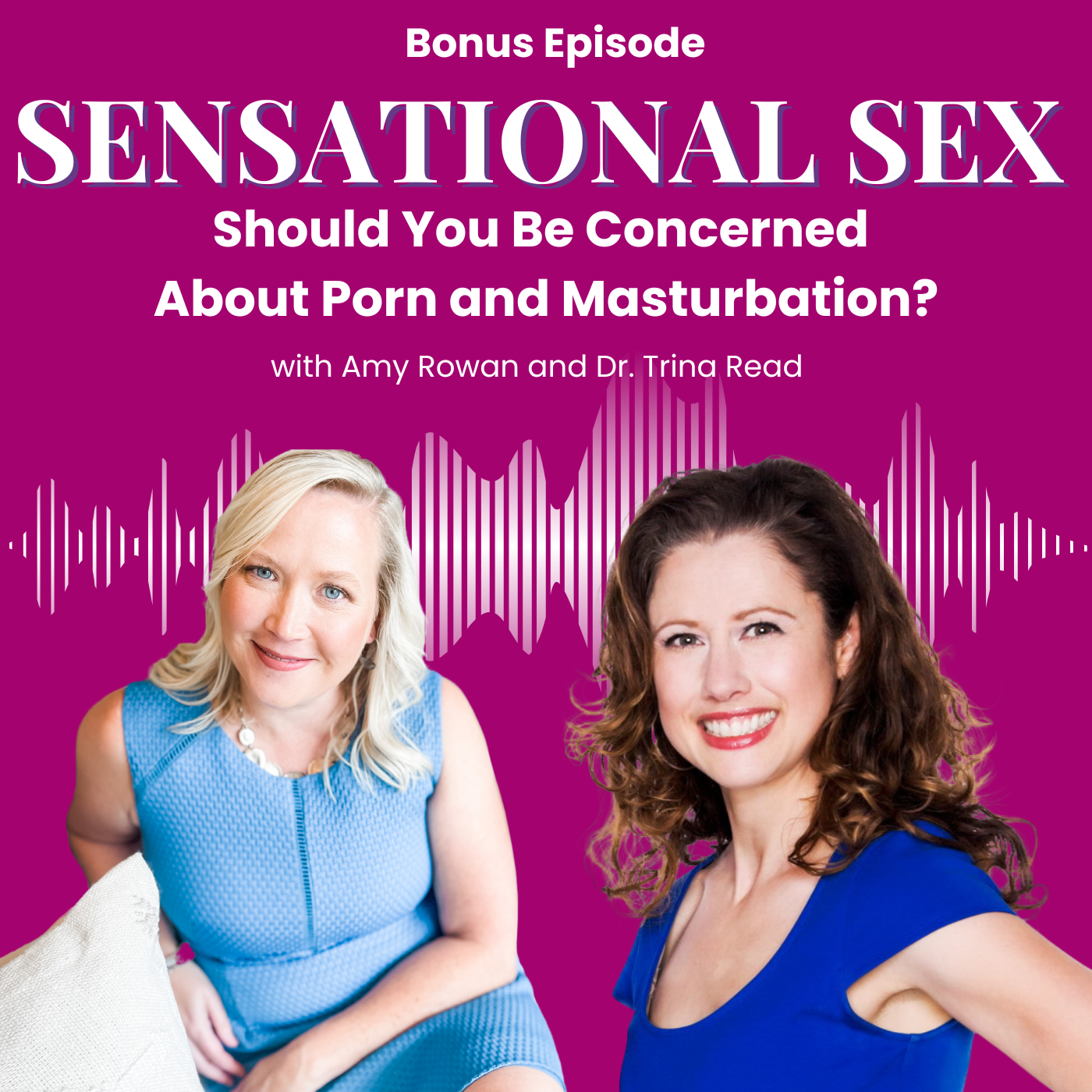Episode Transcript
[00:00:00] Speaker A: Hello, beautiful people. I'm Amy Rowan. Thank you for listening to the sensational sex brought.
Hello, beautiful people. I'm Amy Rowan. Thank you for listening to the sensational sex podcast. We're so happy you're joining us.
[00:00:16] Speaker B: Hello, I'm Doctor Trina Reid. And even though your sex life will never be perfect, you can create the sex life that is perfect for you. And we're here to help you with that.
[00:00:26] Speaker A: Doctor Trina. I've got the joke today. Are you ready?
[00:00:29] Speaker B: I'm ready.
[00:00:30] Speaker A: All right. How is a bridge similar to sex?
[00:00:35] Speaker B: Oh, no. How is bridge?
[00:00:37] Speaker A: Oh, how is bridge? Okay, good, because I didn't get it. Okay, now I understand. I was like, I don't actually understand this one. Okay, let's try again.
How is bridge similar to sex?
[00:00:48] Speaker B: I don't know, Amy. How is bridge similar to sex?
[00:00:52] Speaker A: If you don't have a good partner, you better have a good hand.
[00:00:58] Speaker B: My mother, who's a bridge player, would be mortified with this group.
[00:01:03] Speaker A: Well, tell her to skip this. Well, she doesn't want to skip the episode, but maybe she can just skip the beginning.
Once a month we do a bonus. We can't answer this, but we'll try. Sex question. And this month we're going to tackle whether date nights and overnight trips are realistic for the average couple.
[00:01:24] Speaker B: So does carving the time actually help a couple sex life or. Sorry.
So does carving out the time actually help a couple sex life? And should you. And should you even do it if you don't have the money, energy, or the will to do it?
[00:01:46] Speaker A: This is a big topic, and hopefully we can fit everything in the. Trina, what piqued us doing this? We can't answer this, but we'll try topic.
[00:01:56] Speaker B: Well, there was an Instagram post from motivational wealth that showed a clip of a woman, and they didn't list the woman's name. And she was giving this passionate lecture.
So she was giving this passionate lecture about the seven seven seven principle for or a happy partnership.
[00:02:18] Speaker A: So let's tell everyone what the 777 principle is, and if you want to watch the Instagram post, we will link to it in the show notes. And the woman in the clip, she believes that it is sacrosanct. That every seven days, a couple goes on a cheap mini date, and then.
[00:02:39] Speaker B: Every seven weeks, the couple go on a 24 hours date. It's a simple getaway, like an all day adventure.
It's the couple getting some quality time.
It's the couple getting some quality time where they're not just doing things like doctor's appointments and running errands together.
[00:03:03] Speaker A: And then every seven months, the couple go on a mini vacation away from their kids. And she goes on to say that novel experiences plus physical touch produce dopamine and oxytocin, which are the chemicals that boost attraction and trust. So, Trina, what is your initial reaction to this?
[00:03:26] Speaker B: Well, when I saw the post, I was torn because at the end of it, this woman says, your feelings follow your focus, which I believe to be true. But I had a lot of resistance to this idea of 777, and then I realized that I'm being a hypocrite because I fundamentally believe couples, because I fundamentally believe couples need to carve out time for each other, but I wasn't willing to do it myself.
[00:03:57] Speaker A: Interesting. Well, that's a good observation that you made, and I think that that's a challenge I feel like a lot of people can relate to. You know, professionally, we often give certain pieces of advice, but we may not always follow them ourselves or we may even experience resistance and like, oh, no. That. So it's an interesting feeling that came up for you.
[00:04:22] Speaker B: Well, I've always prided myself, and if I'm going to tell people to do this, I'm going to be doing it myself. Like, that's always been my mo since I started this. So this is one of the first times that I actually came across this idea of, you know, I'm telling people to spend time and make quality time for each other, but am I willing to do this 777 thing? And I'm still on the fence about it.
[00:04:49] Speaker A: I also recommend. One of the biggest things that I recommend to nearly all of my couples is scheduling sex, and that's sounds boring. There's so many good reasons for it. It's something that's really important. That is something that we do do in our relationship. We don't call it scheduled sex, though, but we have a game night and we typically do it once a week. So that would probably be that, you know, mini date, that cheap mini date of some sort. It's something that we enjoy. I. Something that I have always struggled with, and I think it's just my ADHD Gemini brain that I have was, I can't follow any particular.
Like, the second you tell me 777, I immediately want to rebel against it.
I can't follow something scripted like that. I've never, ever been able to do that. That said, I think the concept is right on point, of it's important to have weekly intentional connection, whatever that looks like for that couple.
I think it's important to have some sort of time away and I'll push back against her. Maybe it is going shopping at Costco together.
Sure, if that's what you can pull together. If you can get some time away from the kids and go shopping at Costco and it be a fun, flirty experience, then I would say that that can count.
And, you know, certainly if it's within, you know, means and stuff, being able to get 24 hours away from the kids or a little mini vacation is fantastic. But, you know, within life and everything, obviously that can be challenging.
[00:06:39] Speaker B: So let's read some initial reactions of the many Instagram comments.
You go first, Amy.
[00:06:46] Speaker A: All right, so here's one of the comments. Do you even have kids or a real job? It's hard enough to find a babysitter so you could work or God forbidden, cut the grass or just go to the grocery store. A 24 hours date every seven weeks is impossible. And what the hell is a vacation?
This person's having a rough day.
[00:07:05] Speaker B: Well, no, that was kind of my first reaction, too. When I first, like that was my initial reaction. It was that another person wrote, the seven days and seven months I can get behind, but a night away every seven weeks is not possible in real life.
[00:07:21] Speaker A: Another comment said, and even by the time you pay for a sitter, there goes date night money. We're lucky enough to have my parents willing to help out, but during work hours only. And yes, as a fantasy, you go on a small vacation without your kids, but imagine how that would actually pan out in reality.
[00:07:40] Speaker B: Yeah. Another commenter said, marriage is about being intentional. 777 might not work for some, but plan something consistently and it will work. I'm going to try again. 777 might not work for some, but plan something consistently and work at it. And normally it fixes itself.
[00:08:02] Speaker A: Another commenter said, maybe not 777, but we are working on 1414 date every other week. One night at home while grandma takes the little one every few months. And we try to do one three to four night getaway for our anniversary most years.
[00:08:20] Speaker B: Yeah. So I think there was a wide range. There was people who were supportive and then there was people who are not supportive. I think it covered the span of how people, what people thought about this principle.
[00:08:33] Speaker A: Yeah. And, you know, I will say, at least in our relationship, and we are also lucky because we have parents that are nearby and so we do have the ability, and especially when the kids were younger, and even now we can send our kids to go spend the night with grandparents.
But three is a challenge. And especially when they were little, getting my parents, who were in their seventies at that point, to watch three small children was hard. And so to get that time together, I really did very purposefully go out, and I would say, okay, I'm gonna get this child to go spend the night with this person. I'm gonna have this child go to the grandparents. And it was. It was certainly a feat to make it happen, but it was very important to me and important to us to be able to have one night away. And sometimes it would just be, we just want one night in our house without the kids, so we don't even need to go someplace else. If we can just get the kids out of the house, then we can have a little bit of time together.
[00:09:36] Speaker B: I just remember when I was in that stage of little kids, I just wanted to be by myself. I didn't. You know, you know, if I had a. If I had a night in a hotel, I wanted it to be a night by myself. I didn't want to be spending it with my husband. And I think that, you know, if I remember when the kids were little, this idea, like, this idea has been floating around for many years. And, you know, I just remember thinking, no, I don't want to go to. I don't want to go for an overnight with my husband. I want to go for an overnight with my.
[00:10:10] Speaker A: Yeah, yeah. Well. And, you know, and I remember there was one time, and I don't know if it was an anniversary. I don't remember exactly what it was, but we got all three kids off somewhere. And then I checked into the hotel, and I think James still had to work. I don't know. He had something. So I had, like, 5 hours to myself in the hotel, which was a delight. Like, I took a nap. I read a book. I went and hung out by the pool for. Actually, I think I just probably took a nap and watched Netflix. Honestly, I think that's what I did. But it was great. And so then by the time he did arrive, I was relaxed. I'd had a chance to kind of shed mom and start to kind of get back into being Amy again. And so I think that, like, transitional time was really great, because I think it could be stressful if you're like, we've got 24 hours and checked into the hotel at 07:00. We're having dinner now. It's 10:00. We're home now. We have to have sex. Like, mmm. You know, is that good connection time?
[00:11:11] Speaker B: So I used to make a joke about this 24 hours date thing, you know, it must be, you know, you have sex and then what do you do for the other 23 and a half hours anyways? It's our job to not be cynical or hypocrites and help people understand how they can implement this if and when they have resistance or feeling overwhelmed or feeling overwhelmed to add something else to their already busy life.
[00:11:45] Speaker A: So let's discuss why creating a date night is important. A date night is where a couple intentionally dedicates time spent together, usually alone, with the purpose of reconnecting and bonding. And the optimal word here is intentional.
[00:12:03] Speaker B: Yeah.
Relationships are a living thing that need to be cared for. And without putting in effort, a relationship won't. So without putting in effort, a relationship can't grow or flourish or become all it can be. And I feel like it's so easy to take our connections for granted. So if so, our connections, they don't stay around.
You need to be keeping attention to them in order for them to keep thriving.
[00:12:37] Speaker A: And so spending time with your significant other is really important to your mental, your emotional and your overall wellbeing. And some benefits of date night include it's going to boost your emotional connection by giving you uninterrupted time to talk with and concentrate on your partner.
[00:12:56] Speaker B: It's going to reduce your stress by allowing you to get out and have some fun.
Remember what that was about?
[00:13:03] Speaker A: Yes. Fun. I know we all need more fun in our lives, and it's also going to give you the ability to share and communicate your thoughts and feelings.
[00:13:12] Speaker B: And it sets an example if you have kids by showing them the importance of valuing your relationship. So I think, you know, I hear this and I think, yeah, of course, this all makes perfect sense.
Of course we need to, of course we need to stay connected and of course we have to make sure that we don't take our relationships for granted. And of course, you know, of course this all makes, this is just common sense. And yet the reality is when you're, you know, when you're so busy, it's these, like, this is the first thing our relationships tend to be, the first thing we put to the side on hold because we've got everything else going on, you know?
[00:13:57] Speaker A: And I think the other thing, too, that's important to highlight is a date night doesn't, it doesn't have to mean leaving the house. It doesn't have to mean going out to an expensive dinner.
You can, you know, especially when you are in the very, you know, when you're in the busiest seasons, when you've got the little babies and all of that stuff and it's difficult to leave. You know, you're, you're leaking milk and, you know, all of this stuff and you just don't feel like going out of the house.
Look for, you can either just throw the idea out the window completely or you can look for ways of doing it that's realistic for you right now. Because when we're talking about seasons, like, yes, this is going to evolve and change as well. So, you know, I mentioned before, James and I do a date. We do game night. We've been doing game night forever. And when we had, when our babies were like little itty bitty things, like tiny little newborns in the boxy thing, they were, they were a game night with us just sitting there and we would play games and then I would take a break and go nurse or change a diaper or whatever. But we still did that because it was fun and we enjoyed that time together. And, you know, leaving the house at that point with a five year old and a three year old and a baby was just not possible. But we're still going to start our game night at six instead of at eight, and we're still going to play our game. So, and that was just sort of the intentionality there. And let's find a way to make this work for us where we are right now.
[00:15:28] Speaker B: You did well.
Give yourself a pat on the back for that because.
[00:15:33] Speaker A: Yeah, I think.
No, go ahead. Okay.
[00:15:37] Speaker B: I was just gonna.
[00:15:38] Speaker A: Yeah, if you have.
[00:15:40] Speaker B: Okay. So I think, Amy, we can all agree that intentionally making time for your partner without distractions is the lifeblood of a healthy relationship. And therefore, we can all agree that date nights are important. Therefore, we can all agree in theory. Sorry. Therefore, we can agree that date nights are important in theory. But knowing all of this still isn't enough motivation for many couples to actually.
[00:16:12] Speaker A: The reality is, day in and day out, we are stressed, we are tired. We do have small people touching us and yelling our names and demanding things of us and all of that. And it is the easiest and natural excuse in the world to say, I'm tired, I'm not in the mood. We have a little world inside our hand that is completely and totally personalized to us. And it is so simple and easy for two people to be in the exact same room together on their different devices, one watching the tv show, one playing a game and not connecting because I'm tired. And I would argue, I would present to you that in those times when you are that stressed and that overwhelmed. That is the best time to lean into your relationship. And the love that that gives you, whether that's a hug or sitting next to each other, at least, you know, like, James will sit and watch my stupid reality shows with me. He doesn't like them, but he watches them with me because he just wants to sit and be with me. And I'll sometimes watch football with him, which is, like, the last thing that I ever want to do. But why did you get your husband.
[00:17:29] Speaker B: To watch football with my husband?
That's taken care of.
[00:17:35] Speaker A: Yeah. And then you and I can hang out together. That sounds great.
[00:17:37] Speaker B: And we can watch reality shows.
[00:17:39] Speaker A: We can watch reality shows. But is that nurturing our relationships? Trina.
[00:17:45] Speaker B: Gets happier, but, um.
Happy wife and all that.
[00:17:49] Speaker A: Yeah, absolutely.
[00:17:51] Speaker B: Something that I've seen, uh, something that I've seen a lot is many people wait for other people to take action, so they wait for other people to call. They wait for other people to make plans for them. And so in this 777 principle, these people have to take action and proactively make the plans. So if you're not a planner, you have to ask yourself, you know, is this maybe where the resistance comes from? Where you just think, oh, 777, that just. That doesn't work for me. But I just know that a majority of people don't plan.
[00:18:31] Speaker A: Yeah, well, and if you are the planner in your relationship, and I am absolutely the planner in mine, I think that some people might feel resentment for I'm planning everything else, and now I also have to plan to plan a date night, plan to nurture my relationship. Like, can there be one thing that I don't have to plan? Like, I know that would be my resistance. Honestly, you could probably hear it in my voice right now.
[00:18:58] Speaker B: I'm here.
I'm feeling like we triggered you, Amy.
[00:19:02] Speaker A: Yeah, I do. I plan everything. I am the planner.
And so I think in those moments, it's important. And to your point, about waiting for somebody else, I think also, if we're looking at more, like, traditional gender roles, right in the beginning, traditionally, the man is pursuing the woman, and he is the one who's supposed to ask her out on the date and all of that stuff.
But if 20 years down the line, she's waiting for him to initiate the date and he's not, and she's planned everything else, and she's like, why do I have to plan this, too? And then there's resentment, and then now they're both sitting on opposite ends of the couch, just both being grouchy and nobody connecting. So, you know, that's. And I think that's sort of a typical way that this can play out. So.
And scheduling time together, it gets. It gets the same reaction that scheduling sex. Does. People want this to happen spontaneously.
[00:20:02] Speaker B: Yeah. And do you remember the movie date night with Tina Fey and Steve Carell?
[00:20:08] Speaker A: Yeah, it's been a bit, but. Yes.
[00:20:10] Speaker B: Yeah. So they. At the start of the movie, they're going on their weekly date, and it's boring. And then they come home after this boring date and they're supposed to have sex, but it's just. They don't want to. They just don't have the energy, and they're just so bored. And I think there might be some resistance because people think that if I try and force this, every week we go out for a date night, and every night after the date night, we're going to have sex. It's no longer special that, you know, that monogamy becomes monotonous, which is the death knell.
[00:20:47] Speaker A: Right.
[00:20:47] Speaker B: So this. I think maybe part of this resistance to the 777 is that just. It's just going to be such a routine, boring date night, and, you know, and I'm making all this effort to do this, and I'm getting absolutely nothing from it.
[00:21:04] Speaker A: Yeah. Well, and I can absolutely see that. And I think that if you're going on the date night for the sake of going on a date night versus going on a date night for the sake of connecting with your partner and building the relationship or maintaining or being intentional about that, I think that is where those difference, because. Yeah, I mean, just like, yeah, we're gonna go to our. We can go to the same restaurant every week. We're gonna order the same thing. We're gonna come home, we're gonna do the same kiss, kiss, touch, touch. I do this position, you do this position, we're gonna roll over and go to bed. Good night. Like, yeah, that sounds terribly boring to me, too, so.
But there is a reason why people who schedule sex have better sex more.
[00:21:48] Speaker B: Often, and there's a reason why people who carve out time for each other have an easier time with emotional intimacy. So your motivation can be that by doing this now, by spending some time with your partner now, it's an investment in your future couple happiness. So I think, you know, we. We don't often think about how our actions now are affecting how we're being as a couple in the future. So if you. If you are intentionally like you. You intentionally had a game night with your husband, even when your kids were itty bitty. And because you made that intentional decision to have that game night at least once a week, you're now in a much better place in your partnership. Would you agree?
[00:22:37] Speaker A: Oh, absolutely. 100%.
[00:22:39] Speaker B: So that game night was paying it forward to where you are now.
[00:22:43] Speaker A: Yeah, completely. And, you know, and I'll also say, like, it. It hasn't always been once a week. In fact, it's probably more like once every two weeks. And, you know, again, I rebel. I, like, inherently rebel about being told that I have to do anything on any sort of schedule. Like, I cannot do that, so. But it is much more of a. Hmm. Oh, wait. We have kind of a game night tonight, and he knows that that's pretty much good for. We're gonna have sex. But. But it's. It's. But it's fun. And it's that fun thing that we do, and. And it is. And. But it's nurturing the connection, and we do, like, playing games, so that's something we enjoy doing together. So we've got that bonus in there.
And. And so, you know, if a date night every seven days, if that is too much, then you need to find the rhythm that works for you, and that's certainly what we've done.
[00:23:33] Speaker B: Yeah. So my couple's dating rhythm is once a week. And I'm not talking about sex. I'm just talking about going on a date.
But I also make sure that we go out as a family once per month, which goes completely against the seven seven principle. But that's what works for my family. That's what makes me happy. That's what helps me get the emotional connection and intimacy from my husband.
[00:24:00] Speaker A: Right.
[00:24:00] Speaker B: So we're going out as a. As a partners, but we're also going out as a family, and that makes me very happy.
[00:24:07] Speaker A: Yeah. And we. We do.
I also very intentionally schedule family things over much loud complaining from, especially my older two children. But it's.
[00:24:20] Speaker B: It's.
[00:24:20] Speaker A: It's a hell I'm willing to die on because it's important. And once we do get into whatever it is that we're doing, people, everyone generally has a good time. And, you know, my oldest, like, you know what, mom? That actually was fun. Thanks for planning that. And I'm like, you're welcome. I won't get into all the grouchiness that I had to go through to know, so. But I just say I'm so glad, because our time with everybody home is limited. I've got two years left with my oldest son at home. And so, you know, I want to have those moments, and I want them to look back and remember the things that we did on the random Wednesday nights, you know, over the summer.
[00:24:56] Speaker B: So, well, now that my kids are older, we are going on overnights, and it's been great and nurturing for our relationships. And what I didn't expect is my kids are so happy when we leave and they have the house to themselves. And so the first time we went away, I was feeling kind of anxious because I thought we'd come back to this huge mess. But when we got back, the boys were so intent on having the house to themselves. More often, the house was sparkling.
And just an FYI, this is the only time they do housework. So it's when we go away.
And that said, when they were little, this just wasn't happening. And so I really get it. If parents can't do that, can't do an overnight, and I feel strongly that they shouldn't feel any pressure to do so.
[00:25:53] Speaker A: We haven't yet left our kids at home overnight yet. I do. I still tend to send them all up to the mountains to go be with the grandparents and things like that. So we're doing a little bit more of, we get the house to ourselves and we'll send you guys someplace else. But, I mean, you know, you're honestly making me think we could do that now. My oldest son's about to be 16. My 13 year old, he's babysitting three days a week. He's got his babysitting certification. Like, we could do that. So I'm not.
[00:26:23] Speaker B: It's almost like a rite. It's almost like a rite of passage for the kids that they get the house to themselves. And I guess it depends on the teenager you have. And you have to.
[00:26:34] Speaker A: Yes.
[00:26:35] Speaker B: How so? Some teenagers, you could not leave by themselves, and you don't want to leave by themselves. And, you know, for my. It was good for my kids and. But it definitely was. I remember when I was first left by myself in my, my home, you know, I was a teenager and my parents went on vacation, and I was. Had my first summer job, and they just left me. And it was the best. You know, it was like, I just. I can still remember how wonderful it was that I had the house to myself.
[00:27:06] Speaker A: Yeah, yeah, no, I can certainly see that. And, you know, really, I mean, once my oldest son is driving, which is in just a. Just a few months from now, you know, that really opens all of that up. So. So, yeah. You're honestly you're gonna be excited. I'm taking some overnight, so, because, you know, we've got some different places that we can go and so.
Well, I hope you've inspired some different ideas, maybe given you some motivation, some different ways of looking at things. We would love to hear. What are your thoughts? Thoughts, what are your thoughts on. On the 777 principle? Is this something that you are enacting in your relationship? Or maybe it's not 777. It's 14 1414 or how does this work for you? Do you think this can work for you?
[00:27:49] Speaker B: And we didn't answer the question, but I think we had some good discussion points around it.
[00:27:56] Speaker A: Yeah, absolutely. And I think, again, the.
When you put the intention on nurturing your connection in whatever way that looks for you and your relationship, I think that's the highlight here. And whether it is weekly or 14 days or whatever it is that you can manage, just being intentional about nurturing your relationship, I think is just the important. The most important thing that I'm pulling out of this.
[00:28:29] Speaker B: Definitely the takeaway. Well, thank you, everyone, for joining us.
Until next time, as always, stay sexy.





